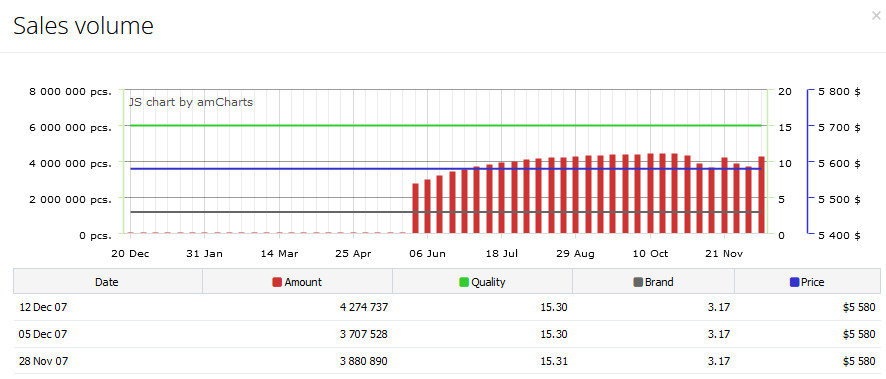Selling the finished goods
The customers of a retail business are computer-generated. Customers can purchase products in retail stores, and gas stations, buy services in -laundries, hair salons, medical centers, etc. All other customers, who buy raw materials, and finished products are real participants in the simulation.
Example of the dynamics of sales in the store:

One game turn in Virtonomics equals one week. The figure shows that the quality of the period increased by almost two times, the price remained the same, but the sales dropped from 1,000 to 500 units. It happened, most likely, because all available products in one game turn are selling out very quickly. Therefore, you need to increase the volumes of supply experiment with increasing the prices.
Managing your sales volumes
You can manage your production sales in factories, warehouses, mines, etc., by setting the selling price, the sales volume per game turn and selecting the conditions of the contract — selling the finished goods only to your company, to particular companies of other participants, sell to any participant or no one at all.
Selling the production of a vertically integrated business
If your goal is to build a company with its own supply chain, from mining to selling the finished goods, strive for the profitability of not only your company as a whole but each subdivision individually.
When selling among the subdivisions of your own company, consider prime costs and selling prices, transport expenses, and taxes.
Try to optimize the whole supply chain, to minimize the expenses and get maximum benefit from the right location and tax policy.
 Business games
Business games  Бизнес игры
Бизнес игры  Juegos de negocios
Juegos de negocios  Geschäftsspiele
Geschäftsspiele  Jogos de negócios
Jogos de negócios  Giochi aziendali
Giochi aziendali  Jeux d'entreprise
Jeux d'entreprise  Trò chơi kinh doanh
Trò chơi kinh doanh  ألعاب الأعمال
ألعاب الأعمال  Επιχειρηματικά παιχνίδια
Επιχειρηματικά παιχνίδια  Forretningsspil
Forretningsspil  משחקי עסקים
משחקי עסקים  商业游戏
商业游戏  비즈니스 게임
비즈니스 게임  Permainan perniagaan
Permainan perniagaan  Zakelijke spellen
Zakelijke spellen  Forretningsspill
Forretningsspill  Gry biznesowe
Gry biznesowe  Jocuri de afaceri
Jocuri de afaceri  İş oyunları
İş oyunları  Liiketoimintapelit
Liiketoimintapelit  Obchodní hry
Obchodní hry  Affärsspel
Affärsspel  ビジネスゲーム
ビジネスゲーム